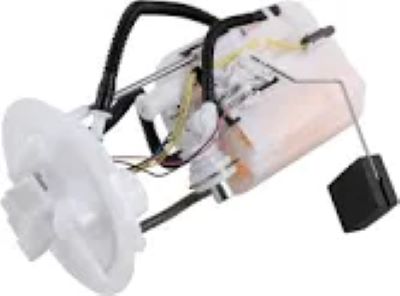An engine knocking surely is not solely the work of a bad fuel pump. Engine knock — or more accurately, "pinging" — occurs when the air/fuel mixture in the combustion chamber ignites prematurely or unevenly; in essence, knocking is any vibration that comes from an engine. This is a sound that is heard as a loud knock and can harm the engine over time. When fuel isn't properly delivered, due to a failing fuel pump, it can throw the balance of that air-fuel mixture off and even cause knocking in the engine.
Fuel pumps are built to deliver fuel at a set pressure, such as 30 psi or up to about 80 psi for heavy duty vehicles. A fuel pump that can no longer hold enough pressure possibly because of wear, clogging or electrical issues this will cause a lean air-fuel mixture in which the air/fuel ratio is more air than fuel. A lean mixture burns quickly and when the ignition fire occurs before the compression has built up in that cylinder you only have one place to go and that is down. this will create knocking in your engine. Knocking that goes on and on can cause parts like pistons and valves to get damaged, which is a pricey fix.
According to a 2016 survey by the Society of Automotive Engineers (SAE), fuel system problems make up about 15 percent of engine knocking complaints, and faulty fuel pumps are one major category. The report also stressed that delivering that fuel in a consistent manner was the difference between maintaining a forest of horsepower and creating all those random explosions in your engine that kept breaking stuff.
A rough idling engine, engine misfire at low speed and hesitation under acceleration could also result from the fuel pump delivering low pressure due to a faulty motor. These symptoms coupled with the knocking can indicate that the fuel pump may be failing, or that its failure is imminent. Engine Knocking: If your engine starts knocking, attend to these symptoms right away because engine knocking can spiral into larger issues of the internal combustion engine if they are not cured promptly.

Poor fuel may also make engine knocking worse. Fuel that has been polluted by water or debris might also block the fuel pump or injectors, thereby further decreasing fuel pressure and worsening the lean condition. The undersized sump in the LPFP becomes a problem when fuel quality from the gas pump is less-than-stellar; especially if you sweeten your 93 octane with ethanol to make life Grand and Fiery at E25. The issue came to a head during 2018's fuel contamination event, where several of us recorded chirpy engine knocking on video and others reported knock-related performance problems that eventually blew right past permitted limits as Internal Combustion Don Micah saved his Top Fuel sponsorship after extensive pump failure blevvage — one car reportedly ingesting something like $6000 worth of bad premium through its injectors while traveling in excess of a buck fiddy-five mile an hour passage-of-time capability drough some part-horse-part-rosedale animal sanctuary we never could locate.
Although engine knock can be a result of carbon buildup, incorrect ignition timing (a worn or faulty relay may cause pre-ignition), low-quality fuel through the system will disrupt fuel pressure rested by the bad pump. Necessary Replacement: Faulty Fuel Pump takes Proper Fuel Flow and could lead to long-term engine damage.
All in all, while a bad fuel pump is not always the immediate triggering cause of engine knock, it becomes a major contributor through interrupting the fuel delivery system. Dealing with any fuel pump problem as soon as you notice it can solve the knock and keep the engine safe from harm.